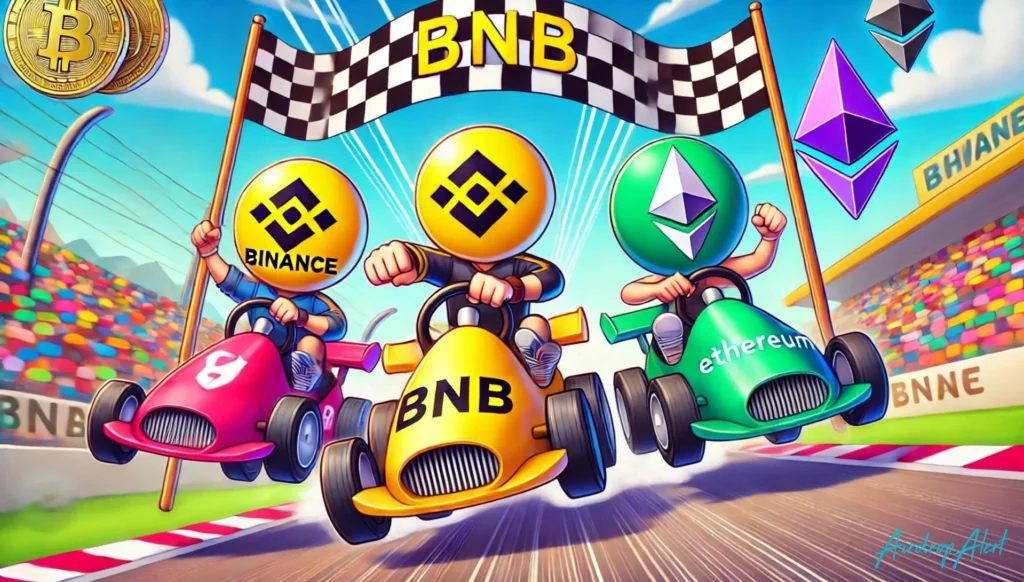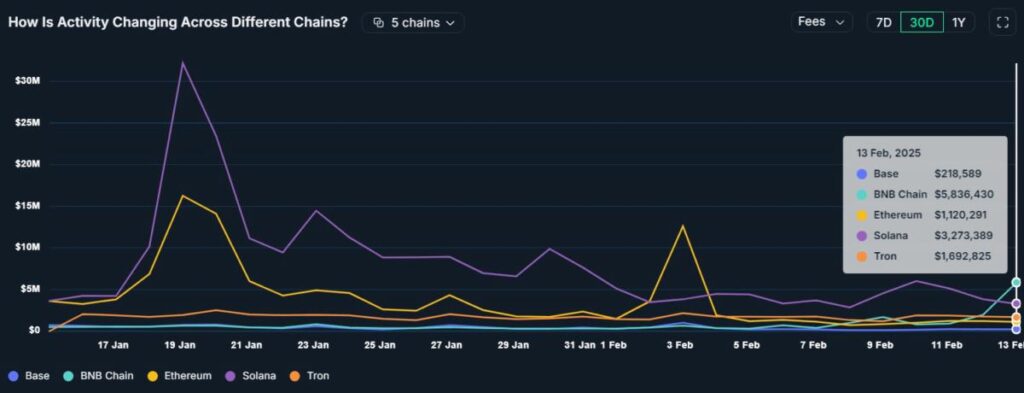
BNB Chain Surpasses Solana in Daily Transaction Fees: What It Means for the Blockchain Ecosystem
In recent developments within the blockchain space, BNB Chain has overtaken Solana in terms of daily transaction fees, marking a significant shift in the competitive landscape of decentralized finance (DeFi) and smart contract platforms. This milestone highlights the growing popularity and increasing activity on the BNB Chain, which has become one of the leading blockchain ecosystems in the crypto industry. The rise of BNB Chain over Solana in daily transaction fees is not just a technical metric; it also reflects broader trends in blockchain usage, scalability, and investor confidence.

Understanding BNB Chain and Solana
BNB Chain, formerly known as Binance Smart Chain (BSC), is a blockchain network developed by Binance, one of the world’s largest cryptocurrency exchanges. Launched in 2020, BNB Chain was designed to provide a high-performance, low-cost alternative to Ethereum, which had been struggling with network congestion and high transaction fees. BNB Chain offers fast transaction speeds and low fees, making it an attractive option for developers and users within the DeFi space. It supports a wide range of decentralized applications (dApps), from decentralized exchanges (DEXs) to lending platforms, NFT marketplaces, and more.
Solana, on the other hand, is another high-performance blockchain network that gained significant attention due to its incredibly fast transaction speeds and low fees. Launched in 2020, Solana set out to address the scalability issues faced by Ethereum and other blockchains by utilizing a unique consensus mechanism known as Proof of History (PoH), combined with Proof of Stake (PoS). Solana’s innovation allowed it to achieve thousands of transactions per second (TPS), positioning it as a direct competitor to Ethereum and other smart contract platforms. Solana’s low transaction fees and high throughput have attracted a strong developer community and a growing number of users.
However, recent data has revealed that BNB Chain has surpassed Solana in daily transaction fees, a sign that the dynamics of the blockchain space are shifting.
The Significance of Surpassing Solana in Daily Transaction Fees
Transaction fees are a key indicator of a blockchain’s usage and activity levels. High daily transaction fees typically point to increased demand and network congestion, which can be a positive sign of growth. When a blockchain network sees its transaction fees rise, it often signals that more users are interacting with the network, using decentralized applications, and conducting transactions.
For a long time, Solana was a leader in the race to offer low-cost, high-speed blockchain solutions. Its ability to maintain minimal fees while processing a large number of transactions made it highly attractive to developers and users, especially in comparison to Ethereum’s often prohibitively expensive gas fees. Solana’s popularity surged with the growth of DeFi projects, NFT platforms, and other dApps that leveraged its fast transaction times and low costs.

However, BNB Chain’s recent rise in daily transaction fees indicates that it has gained significant traction, both in terms of user adoption and dApp usage. The surge in transaction fees on BNB Chain suggests that the network is seeing an increasing number of users engaging with its decentralized applications, leading to greater demand for block space. This shift is especially notable because Solana was once seen as the more scalable option, with its high throughput and fast confirmation times.
Factors Contributing to BNB Chain’s Growth
Several factors have contributed to BNB Chain’s rise and its ability to surpass Solana in daily transaction fees. The first is the integration with the Binance exchange, which provides BNB Chain with a massive user base and significant liquidity. Binance’s global presence and established reputation have driven substantial traffic to BNB Chain, creating an ecosystem where users can seamlessly trade, invest, and interact with a variety of crypto services.
Additionally, BNB Chain’s focus on low transaction fees and scalability has made it a popular choice for developers building on-chain applications. The network’s ability to provide fast and cost-effective transactions has attracted a diverse range of DeFi projects, from decentralized exchanges like PancakeSwap to lending platforms like Venus Protocol. These applications have experienced rapid growth, leading to an increase in on-chain activity and higher daily transaction volumes.
BNB Chain’s focus on supporting cross-chain interoperability has also helped expand its ecosystem. By enabling interactions between BNB Chain and other blockchains, such as Ethereum and Solana, BNB Chain has fostered a more connected and diverse crypto ecosystem. This has allowed BNB Chain to attract users from other blockchain networks, further boosting its transaction volumes.
The Role of NFTs and DeFi in BNB Chain’s Success
Another key driver behind BNB Chain’s rise is the growing popularity of decentralized finance (DeFi) and non-fungible tokens (NFTs). BNB Chain has become a hub for DeFi projects, with numerous protocols offering decentralized lending, trading, and yield farming opportunities. The low fees and fast transaction times on BNB Chain make it an attractive platform for DeFi enthusiasts looking to avoid the high costs associated with Ethereum.
In addition to DeFi, BNB Chain has also become a popular platform for NFTs. The rise of NFTs has contributed to increased activity on BNB Chain, with various NFT marketplaces and projects choosing to build on the network due to its scalability and affordability. As NFTs continue to gain traction, BNB Chain’s role as a platform for digital collectibles and art has only strengthened.
Solana’s Challenges and the Competitive Landscape
While Solana has long been a dominant player in the blockchain space, it has faced a series of challenges in recent months. In particular, Solana has experienced several network outages, which have caused significant disruptions to its ecosystem. These outages have raised concerns about the network’s reliability and have prompted some developers to reconsider their use of Solana for mission-critical applications.
Additionally, Solana’s rapid growth and high throughput have led to concerns about centralization. The network’s reliance on a relatively small number of validators has led some critics to question its long-term decentralization and security.
Despite these challenges, Solana remains one of the most promising blockchain networks, with strong developer support and a rapidly growing ecosystem. However, the recent shift in transaction fee rankings suggests that the competitive landscape is becoming more fluid, with BNB Chain emerging as a stronger contender in the battle for blockchain supremacy.
What Does This Mean for the Future?
The rise of BNB Chain surpassing Solana in daily transaction fees signals a maturing and evolving blockchain ecosystem. It highlights that the demand for scalable and low-cost blockchain solutions is growing, and users are actively seeking alternatives to Ethereum’s high gas fees. BNB Chain’s success also demonstrates the increasing importance of network effects, as the backing of Binance has provided it with a significant advantage in terms of liquidity and user adoption.
As both BNB Chain and Solana continue to develop and refine their ecosystems, it’s likely that the competition between these two networks will intensify. BNB Chain’s recent achievement in surpassing Solana in daily transaction fees may mark the beginning of a new phase of blockchain competition, where multiple networks coexist and offer different strengths to developers, investors, and users.
For now, the focus remains on scalability, user experience, and the ability to support a growing range of applications. The ongoing battle between BNB Chain and Solana will shape the future of the blockchain landscape, with each network vying to attract more users, developers, and projects in an increasingly crowded market.